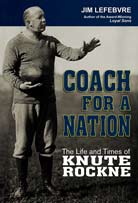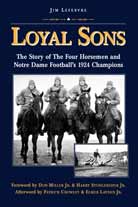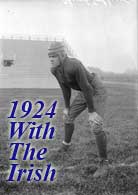The parallels are unmistakable.
Experience as a winning head coach in major college football – yet with tons of youthful enthusiasm. Staffs eager to make their mark on a legendary college campus. And a fan base yearning for a return to the pinnacle of the sport.
As Brian Kelly prepared his first Notre Dame football team for its Sept. 4 opener vs. Purdue, one can’t help but think of the similarities with a time 46 years ago, when 41-year-old Ara Parseghian was gathering his first Irish team on campus.
Like Kelly’s progression, with successful stops at Grand Valley State, then Central Michigan, then Cincinnati, Parseghian had a career with a steady upward climb. From assistant coach at his alma mater, Miami of Ohio, to head coach at the school, to head coach in the Big 10 at Northwestern (where he defeated Notre Dame four straight years) to head coach of the Fighting Irish. In 11 seasons at Notre Dame, he fashioned a stellar record of 95 wins, 17 losses and 4 ties, for a winning percentage of .836. Along the way, he guided the Irish to national championships in 1966 and 1973.
This summer, Forever Irish editor Jim Lefebvre sat down with Ara, the coaching legend, and asked him to recall his days as coach of the Irish. At 87, his handshake is firm, and his eyes still light up when talking about football, coaches, competition, molding young lives.
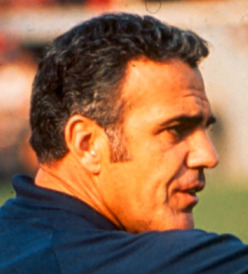 |
“We had something special out there. Two things — discipline for four quarters of football, and mental preparedness….We preached that we had no breaking point as a team — there’s no circumstance we can’t overcome.” |
Ara’s teams included players who were good athletes, intelligent and coachable, and his staff did an excellent job of preparing them to succeed. Yet, on so many golden afternoons at Notre Dame Stadium or somewhere else, there was something more – a spirit of success, a will to win. Somehow, they would find a way to prevail. Looking back, how would the coaching legend describe it?
“We had something special out there,” Ara said. “Two things — discipline for four quarters of football, and mental preparedness. They knew, over the course of a season, there would be circumstances when you get in a game, that everything goes against you for some reason. We preached that we had no breaking point as a team — there’s no circumstance we can’t overcome.
“We’d approach it from a mental standpoint. I said, ‘your opponent has a breaking point.’ I don’t know if it’s going to be 7 points, 10 points, 13 points….when they get behind, they’re done. But we have no breaking point. We preached that it’s an unpredictable game, you might fumble the opening kickoff. That can happen. But we have no breaking point, and that thinking solidified the unit.”
In talking with the media to kick off this year’s fall camp, Coach Kelly mentioned the importance of Notre Dame tradition to his way of coaching. “That is the pervasive theme here: Let’s get back to understanding the great tradition, who we are, how we play the game….I will tell you that toughness, that ‘Fighting Irish,’ is certainly the theme that we want to continue to advance forward.”
And so it was with Parseghian’s teams.
“We would tell the players, ‘We’ve got the spirit, the history of Rockne at ND…football all through the years….Leahy…the successful national championships…..and so we’re telling them, there’s no circumstance we can’t overcome. We can fall behind 21-0, but we can overcome that. I’ve seen teams as they get in the game and fall behind, and you can see it start to melt. But not if you have unity.
“We built a unity, and that’s what it’s all about. You teach spirit, the cause, the preparation.
“If you build that mentality into them, that makes them tough. That’s the other thing we did with our teams — we were physically tough – both on offense and defense. We played by the rules, we were well conditioned, and we played with enthusiasm.”
If you polled Fighting Irish fans of the past 15 years or so, they would probably point to physical toughness, conditioning and enthusiasm as being three areas often lacking in ND’s teams.
“It’s a multitude of things, really, coaching is so many things…so many things can influence the outcome of a game, you have to hold it together. But if you don’t have direction, you waste talent.”
Many would call the Notre Dame teams of 1959-63 directionless. That changed when Ara took over in 1964. His first challenge was to instill a change in attitude. Much like Coach Kelly, who has said, “Before you can learn to win, you have to teach them to stop losing.”
Here’s how Ara approached it.
“Notre Dame had not had a winning season in five years. And so, what do you think are the attitudes of the players? They are beaten down. Not only is everyone looking at them and saying they are not worth a darn, they start to believe it. Whether an individual player as well as the team. When you’re losing, I tell you, everything is drudgery, coming to practice, it’s no fun.
“That’s why when you come in (as the new coach), you better bring a unity to it. That’s why I felt that the most important game, for me, was the first game of a season, particularly when I was at Notre Dame. There are no warm-up games. You have to be ready.
“(In 1964) I knew that we were going to open up against Wisconsin. Wisconsin had been a nemesis for us at Northwestern, and knocked us out of the Rose Bowl a couple of times. So we’re going back up there to play again. That first game, it’s so important. I’m telling you, this is what you’ve got to do if you want to be successful. You’re out there with two-a-days, you’re working your butts off, pushing the kids and in the process you’re not only affecting the physical, you’re affecting the mental.
“You’re getting them prepared mentally as well as physically….and planting in their minds that you ARE good…you CAN win….and if you do these things we WILL win. A positive attitude….that’s what we did here. So, if I go out and tell you all that and you get beat 40-0, where does that put you? You have another game coming up and now you don’t know what to believe. I was well aware of the fact that if I’m preaching something that makes you believe in me, as I believe in you. But if we get whipped, then can you still believe in what I’m telling you?”
But on that day, Sept. 26, 1964, at venerable Camp Randall Stadium in Madison, the Irish didn’t get whipped. They did the whipping. To the tune of 31-7 over a team that was used to competing for Rose Bowl berths.
Ara is still getting requests to sign the now-famous photograph. It’s the one with him perched on his players’ shoulders, being carried off the field. The distinctive roofline of the old UW Fieldhouse is in the background, so the location is unmistakable.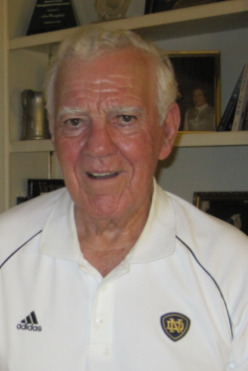
“When they picked me up and carried me off, that’s what they were saying. We believe what you told us about ourselves. We’re now bonded together in effort. The kids all feel that, ‘We are better than we thought we were.’”
It’s no coincidence that Parseghian’s teams won their opener 24 times in 25 tries. The preparation, the mental and physical toughness, put his teams in great position for the opener.
And in 1964, it was a confidence that grew with each succeeding week. Led by a quarterback, John Huarte, who had not yet won a letter at Notre Dame, the Irish bested one opponent after another, stumbling only in the finale at Southern Cal, in a game marred by several questionable calls. The final mark: 9-1.
Is a similar first year possible for Kelly? Ara, like many Irish supporters, doesn’t want to add to Kelly’s burdens as Notre Dame coach. But in the longer view, he sees good things ahead.
“What I like about Brian, he played on both sides of the ball, he’s coached on both sides of the ball and he’s coached at three different places, which is good. This guy has the experience of being a head coach, almost 20 years worth. And being successful everywhere he’s been. He’s knowledgeable in all aspects of the game. And he understands what it takes to motivate a team — he’s a good motivator.
“People tend to misjudge the importance of the mental aspect of the game. When I was at Northwestern, if I talked about the mentality, the psychology of the game, the response was sometimes, ‘Oh you’ve got to be kidding.’ I think today coaches are more likely to talk about the ‘inner game.’
“There’s inner strength within, you know. The body is well conditioned, but the mind controls the body. You mind’s going to tell you what you’re going to do with your body. And when you have a whole effort that’s going to come from every player, the dedication that they have to show. That is when it’s so important, that the mind is going to tell the body ‘we’re going full force.’
“And I think this guy (Coach Kelly) has that ability, to get the players thinking that way.”
When Ara eases back into his chair to watch the Purdue game, what will he be looking for to indicate that there’s been a change in direction?
“What you’ll look for in the game is intensity, the ability to rebound if there’s any kind of adversity….how well they are physically equipped…..how well their schemes are working against their opposition….whether they’re well-schooled in the kicking game…whether they’re giving up a lot of field position. The thing (about immediate results) is that you can have, let’s say, nine really good starters on offense – maybe two guys not quite up to speed – that’s a weak spot. The same way defensively. The reason I say that is it may take him three years to really solidify things, to eliminate any weak spots.”
Hmm, let’s see. In Parseghian’s third year at Notre Dame, 1966, the Irish went undefeated and captured their first national championship in 17 years.
I think something close to that would please today’s ND fans just fine.

